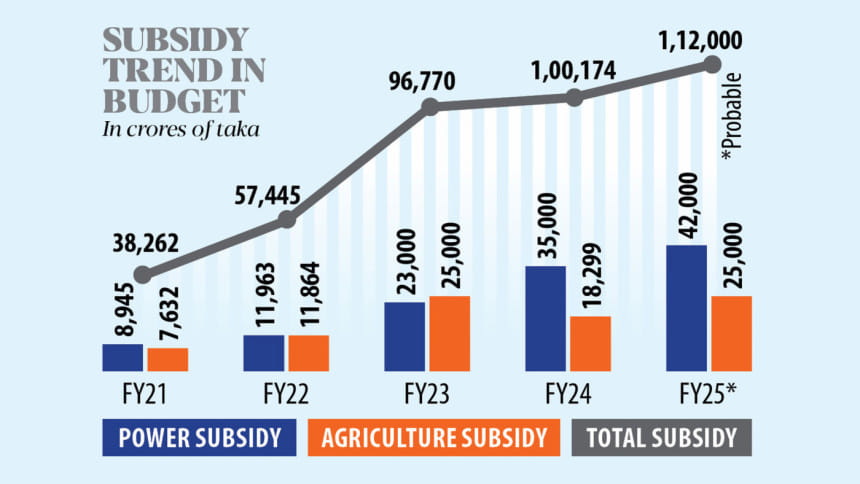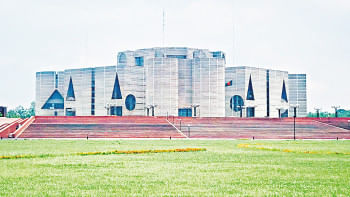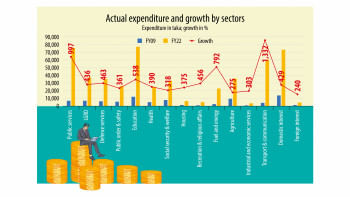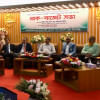Power, agriculture to drive up subsidies

The subsidies and incentive expenditures in the upcoming budget are going to be more than that of the current fiscal year.
The subsidies are mainly increasing in the power, energy, and the agriculture sectors.
Even though the government plans to raise power tariffs four to five times a year, the highest subsidy allocation is likely to go towards the electricity sector.
Finance ministry officials said the increased subsidy allocation was largely due to the arrears in the power and agriculture sectors.
In the upcoming fiscal year, which begins on July 1, the subsidy allocation is likely to be Tk 1,12,000 crore, up from Tk 1,00,174 crore in the outgoing fiscal year.
Of the sum to be set aside for 2024-25, the power sector is likely to get Tk 42,000 crore. The government has earmarked Tk 35,000 crore for 2023-24.
Before 2021-22, the subsidy allocation for the power sector was between Tk 7,000 crore and Tk 9,000 crore.
Khondaker Golam Moazzem, research director at the Centre for Policy Dialogue, said the main reason behind the rising subsidy allocation in FY25 is the higher energy prices in the international market and elevated capacity payments.
He said the government has planned to increase power tariffs several times, but the sector will require more subsidies as more power plants, including Rooppur nuclear plant, are ready to produce electricity.
"If the old and inefficient power plants are not phased out, the overall capacity charges will increase, which will deepen the subsidy burden," he told The Daily Star.
The recent mission of the International Monetary Fund also questioned the huge subsidy allocation in the power sector.
However, it is not possible to withdraw subsidies immediately from the power sector as it will hurt the economy. The government plans to increase power prices over the next three years so that the subsidies can be withdrawn, said finance ministry officials.
The subsidy for importing liquefied natural gas (LNG) for FY25 is likely to be Tk 7,000 crore, which is Tk 6,000 crore in the current fiscal year.
The agriculture subsidies were between Tk 5,000 and Tk 7,500 crore until FY22, but it has been on the rise since. In FY23, the allocation was Tk 25,000 crore and it rose to Tk 25,000 crore this fiscal year before it was revised downwards to Tk 18,000 crore.
It is likely to be Tk 25,000 crore next year.
The government usually provides subsidies to the export sector in the form of incentives to businesses. In the current fiscal year, Tk 9,025 crore was set aside, and it is likely to reduce to less than Tk 7,000 crore, according to the officials.
This is because due to Bangladesh's impending graduation from the group of least-developed countries, subsidies will eventually be phased out since World Trade Organisation rules don't allow developing and developed countries to give direct cash aid to exporters.
"We are thinking about the alternate measures in this regard, which will be incorporated in the new export policy," said an official.
Remittance subsidy in the upcoming budget will be unchanged at Tk 6,200 crore, while food subsidy will increase to Tk 7,000 crore from Tk 6,900 crore.
SOCIAL SAFETY NET
Even though economists suggested increasing the allocation for social safety net programmes so that people can cope with higher inflation, the budget in the area is likely to be lower.
Funds equivalent to about 2.5 percent of the GDP are likely to be allocated for social safety net schemes against 2.52 percent currently. However, the allocated amount may increase to Tk 1,32,000 crore from Tk 1,26,272 crore.
The government may increase the number of beneficiaries by around four to five lakh. However, the allowance per person may remain the same, according to officials.
Yet, the allowance may increase for the beneficiaries in two major groups: senior citizens, and widows, deserted, or destitute women.
In the case of senior citizens, a person will get Tk 600 per month and widows, deserted, or destitute women will get Tk 550 per month.
A top finance ministry official said they would reform the social safety net distribution system in FY25 before expanding the programmes.
In a circular recently, the ministry said all funds for social programmes must be disbursed through the mobile financial service (MFS) account registered with the national ID card of the beneficiaries. This must be ensured by June 30, 2025, it said.
At present, allowances under many schemes are paid via MFS, but often not to the registered accounts of the beneficiaries, which leaves room for irregularities.
The government provides social safety net benefits through around 130 programmes.
Analysts question whether some programmes are truly benefiting the poor. They also say a huge amount is being wasted due to corruption in distribution.
The finance ministry has asked all ministries to submit reports detailing who is receiving the allowances and the goals of the programme.
Based on the reports, the ministry will prepare a report as per the recommendations of the World Bank and the IMF.


 For all latest news, follow The Daily Star's Google News channel.
For all latest news, follow The Daily Star's Google News channel. 










Comments